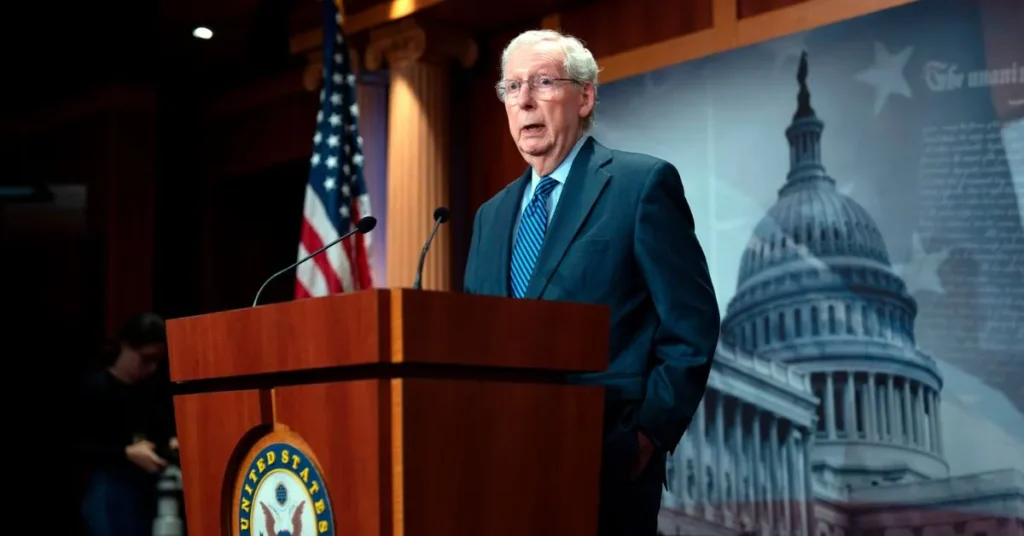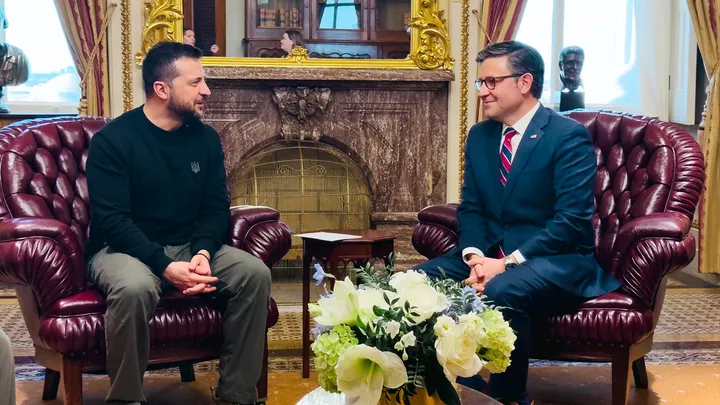Foreign aid package worth $95 billion US Aid To Ukraine Israel and Taiwan
On Tuesday night, the Senate gave the green light to a significant foreign aid package worth $95 billion. This aid is destined for Ukraine, Israel, and Taiwan, marking a bipartisan victory that has been in the works for months.
The final vote was 79-18 in favor of the package, showcasing substantial support from both sides of the aisle. Thirty-one Republicans teamed up with 48 Democrats to push the legislation through. This marks an increase in Republican support compared to February, with nine more Republicans backing the aid package this time around.

However, not everyone was on board. Two Democrats, Senators Merkley and Welch, along with independent Senator Bernie Sanders, voted against the legislation, joining forces with 15 Republicans who also opposed it.
The aid package consists of four bills that had previously passed in the House with bipartisan backing over the weekend.
Read More: Focus on climate change crisis, not on wars: Climate scientists on World Earth Day
The aid package is now on its way to President Joe Biden’s desk, where he intends to sign it tomorrow. In a statement, Biden expressed his satisfaction with the bipartisan effort, highlighting that a majority in both the Senate and the House responded to the urgent needs of the moment.
Biden emphasized that this legislation strengthens national security and sends a clear message to the world about America’s commitment to democracy and freedom. He underscored that the United States stands firmly against tyranny and oppression.
“I will sign this bill into law and address the American people as soon as it reaches my desk tomorrow so we can begin sending weapons and equipment to Ukraine this week,” his statement continued. “The need is urgent: for Ukraine, facing relentless bombardment from Russia; for Israel, which has recently endured unprecedented attacks from Iran; for refugees and those affected by conflicts and natural disasters worldwide, including in Gaza, Sudan, and Haiti; and for our partners in the Indo-Pacific seeking security and stability. I want to express my gratitude to Leader Schumer, Leader McConnell, and all the bipartisan lawmakers in the Senate who supported this bill. This crucial legislation will enhance the security of our nation and the world as we stand by our allies defending themselves against terrorist groups like Hamas and oppressive regimes like Putin’s.”

The package allocates around $26 billion for Israel, currently engaged in conflict with Hamas in Gaza. Additionally, $61 billion is designated for Ukraine, and $8 billion is earmarked for allies in the Indo-Pacific region.
One of the bills within the package would compel a U.S. ban on TikTok if its Chinese parent company fails to divest it. This bill also includes provisions for imposing sanctions on Russia, China, and Iran, along with seizing Russian assets to aid Ukraine in rebuilding from the aftermath of the conflict.
“A lot of people, both inside and outside of Congress, wanted this package to fail. But today, those in Congress who stand for democracy are prevailing,” Schumer said after the Senate passed procedural votes on Tuesday afternoon. “To our friends in Ukraine, to our NATO allies, to our partners in Israel, and civilians worldwide in need of assistance — help is on the horizon.”
During a comprehensive press conference following the procedural vote, Senate Minority Leader Mitch McConnell expressed his belief that his party is starting to push back against the isolationist tendencies he has long opposed. While acknowledging that the isolationist inclination within his party still exists, McConnell said that he sees progress being made.
“If you’re searching for a trend, I believe it’s a trend in the direction that aligns with my vision, where America embraces its leadership role in the world and takes the necessary actions,” McConnell said.
He counted the groundswell of GOP support as a win.
“I believe we’ve shifted the tide on this debate,” he said further stating, “I think we’ve shifted the tide on the isolationist sentiment. I’ve observed how uneasy advocates of isolationism become when labeled as such. I think we’ve made some headway, and I believe it must persist.”
Schumer praised the bipartisan effort to pass this legislation, highlighting his collaboration with McConnell.
“Leader McConnell and I, who don’t always see eye to eye, worked closely and cooperatively to push this bill through. Together, we demonstrated bipartisanship and perseverance,” Schumer said.
US Aid To Ukraine Israel and Taiwan. What next?
Earlier this month, America’s top general in Europe emphasized the importance of Congress’ passage in providing aid to ally countries, especially Ukraine. General Christopher Cavoli of U.S. European Command highlighted Ukraine’s critical need for funding to sustain its fight against Russia.
He explained, “Currently, Ukrainian forces are significantly outnumbered in artillery firepower. The Russians are firing five times as many artillery shells at the Ukrainians compared to what the Ukrainians can fire back. And this gap is expected to double to ten to one in just a matter of weeks, not months.”

Cavoli stressed that the outcome of the war hangs in the balance. “The seriousness of this moment cannot be emphasized enough. Without continued support, Ukraine risks losing,” he cautioned.
In anticipation of the bill’s passing, the Biden administration has prepared a military assistance package worth approximately $1 billion for Ukraine. According to a U.S. official who spoke to NFL News on Tuesday, the first shipment is expected to arrive within days of the bill’s approval.
The package will include urgently needed artillery rounds, air defense ammunition, and armored vehicles, as confirmed by the official. These weapons and equipment will be sourced from existing U.S. stockpiles under presidential drawdown authority (PDA).
It has been over a year since Congress last approved new aid for Ukraine in its struggle against Russian invaders. The conflict has escalated in recent weeks, with more Russian strikes penetrating Ukrainian air defenses that are running low.
President Biden had a conversation with Ukrainian President Volodymyr Zelenskyy on Monday to reaffirm U.S. support for the nation. Zelenskyy expressed his gratitude to Biden “for his steadfast support for Ukraine and his genuine global leadership.”

The Ukrainian leader praised House Speaker Mike Johnson for his evolution in position regarding Ukraine aid. Johnson initially sought changes to border and immigration policy alongside aid but later collaborated with Democrats to pass the latest bills. Additionally, he commended House Minority Leader Hakeem Jeffries, D-N.Y.
Biden initially called for increased assistance for Ukraine, Israel, and the Indo-Pacific last fall. Although the Senate approved a $95 billion bill in February, the legislation encountered obstacles in the House. A coalition of Republican hard-liners opposed sending additional resources overseas without addressing domestic issues like immigration, causing a logjam in the process.
Simultaneously, GOP leaders like Johnson echoed these concerns and advocated for significant changes to immigration policy. However, a comprehensive deal in the Senate that linked foreign aid to such changes faced opposition from former President Donald Trump and was deemed insufficient by conservatives.

Subsequently, pressure mounted on lawmakers to approve aid for overseas allies following Iran’s unprecedented attacks on Israel earlier this month. These attacks were in retaliation for a strike on an Iranian consular complex in Syria. Additionally, as Russian forces continue to advance, the urgency to assist allies has increased.
Speaker Johnson, who was previously against providing more aid for Ukraine, recently expressed his willingness to stand by the issue even at the risk of facing an ouster threat from fellow Republican Representatives Marjorie Taylor Greene, Thomas Massie, and Paul Gosar.
Johnson’s change of stance earned bipartisan praise. Republican Representative Michael McCaul, the House Foreign Affairs Committee Chairman, commended Johnson for shifting his position. McCaul noted that Johnson initially attempted to align with the desires of the Freedom Caucus but ultimately recognized that such a stance wouldn’t succeed in the Senate or the White House. With time running out and Ukraine facing imminent danger, Johnson transformed the issue.
Following the passing of the procedural votes, even Senate Majority Leader Schumer lauded Johnson’s actions. “I thank Speaker Johnson, who, in his own words, rose to the occasion and acknowledged the need to do the right thing despite facing tremendous political pressure,” Schumer said.
